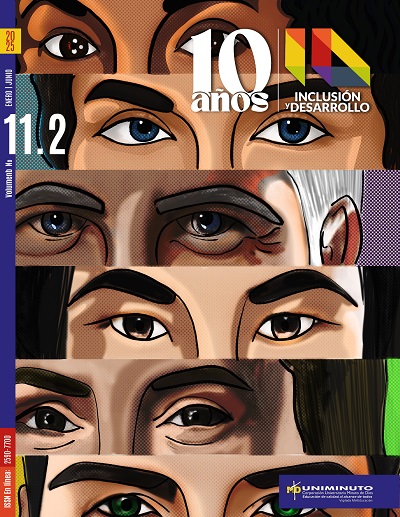No todo es como lo hemos aprendido obstrucciones epistemológicas de la educación inclusiva
Barra lateral del artículo
Cómo citar
Altmetrics
Detalles del artículo

Esta obra está bajo una licencia internacional Creative Commons Atribución 4.0.
Contenido principal del artículo
Resumen
En esta oportunidad se analizan algunas opresiones fundamentales que afectan al género académico indexado como educación inclusiva. A tal efecto, sostengo que lo que conocemos como educación inclusiva no es tal cosa. Sólo conocemos un disfraz pseudo-heurístico que impone los paradigmas fundantes de la educación especial, su modelo didáctico y epistemológico, para rellenar estratégicamente un espacio en blanco. Lo que nombramos a través del sintagma ‘educación inclusiva’ no es más que un sistema de transliteración arbitraria de diversos cuerpos de saberes, formas categoriales y repertorios metodológicos propios de la educación especial, cooptando signos definitorios – identidad y rostricidad– de la educación inclusiva. Estamos en presencia de un territorio de investigación que deambula con gran fuerza por diversas estructuras académicas, compromisos éticos y proyectos políticos –muchos de ellos, de dudosa reputación– sin saber quién es. El trabajo concluye observando que, tomar la educación especial como educación inclusiva es incurrir en el mismo fallo.
Referencias
Bal, M. (2009). Conceptos viajeros en las humanidades. Una guía de viaje. Murcia: Cendeac.
Best, S. & Kellner, D. (1991). Postmodern Theory. London: Guilford Publications.
Braidotti, R. (2002). Metamorfosis. Hacia una teoría materialista del devenir. Madrid: Akal.
Braidotti, R. (2006). Feminismo, diferencia sexual y subjetividad nómade. Barcelona: Gedisa.
Braidotti, R. (2009). Transposiciones. Barcelona: Gedisa.
Corona, J. (2018). La ontología del presente. Valenciana, [s.l.], v. 22, n. 11, p. 315-322, 2018. Recuperado el 02 de mayo de 2020 de: http://www.scielo.org.mx/pdf/valencia/v11n21/2007-2538-valencia-11-21-315.pdf.
Chambers, I. (2009). La cultura después del humanismo. Madrid: Ediciones Cátedra.
Cho, S., Crenshaw, K. & McCall, L. (2013). Toward a field of intersectionality studies: theory, applications, and praxis. Signs 38, 785–810.
Deleuze, G. & Guattari, F. (1968). Mil mesetas. México: FCE.
Esperón, J. P. (2016). Heidegger, Deleuze y la diferencia. Aportes para pensar la irrupción de la novedad. AISTHESIS, Nº 59, 143-156.
González, B. (2018). La ética diferencial de Rosi Braidotti. Agora. Papeles de filosofía, 37 (2), 173-191.
Lazzarato, M. (2006). Por una política menor. Acontecimiento y política en las sociedades de control. Madrid: Traficantes de Sueños.
Mouffe, Ch. (2007). En torno a lo político. Comunidad, ciudadanía, pluralismo y democracia radical. Buenos Aires: FCE.
Ocampo, A. (2017). Epistemología de la educación inclusiva. Granada: UGR.
Ocampo, A. (2018). La formación del profesorado y la comprensión epistemológica de la educación inclusiva: tensiones, permeabilidades y contingencias. Santiago: Fondo Editorial CELEI.
Ocampo, A. (2019). Contornos teóricos de la educación inclusiva. Boletín Redipe, [s.l.], v. 8, n. 3, p. 66-95.
Ocampo, A. (2020). Inclusión como método. Revista Atos de Pesquisa em Educação, V.15, n.1, 1-30.
Ocampo, A. (2024). “Problemas fundamentales de la educación inclusiva”; en: Vercellino, S., Ocampo, A. & Arciniegas, M.L. (Comps.). Estudios sobre Educación Inclusiva em Latinoamérica. (pp.16-83). Santiago: Fondo Editorial CELEI.
Oppermann, S. (2011). Ecocriticism’s theoretical discontents. Mosaic: A Journal for the Interdisciplinary Study of Literature, [s.l.], v. 44, n. 2, p. 153-169. Recuerado el 12 de agosto de 2020 de:
https://www.researchgate.net/publication/236830201_Ecocriticism’s_Theoretical_Discontents. Acesso em: 25 mar. 2020.
Perea, A. (2011). La ontología crítica del presente de Michel Foucault como heterotopología de la subjetividad moderna. Tesis (Doctoral) – Pontificia Universidad Javeriana, Bogotá.
Spivak, G. (2006). Crítica de la razón postcolonial. Hacia una historia del presente evanescente. Madrid: Akal.
Artículos más leídos del mismo autor/a
- Aldo Ocampo González, Perspectivas para un «enfoque re-construccionista» de la «educación inclusiva» en el siglo XXI (Prospects for a "Reconstructionist Approach" of "Inclusive Education" in the XXI century) , Inclusión y Desarrollo: Vol. 3 Núm. 1 (2016): Enero - Junio
- Aldo Ocampo González, Producción social del espacio: el capital y las luchas sociales en la disputa territorial (Social production of space: capital and social struggles in the territorial dispute) , Inclusión y Desarrollo: Vol. 4 Núm. 1 (2017): Enero - Junio





